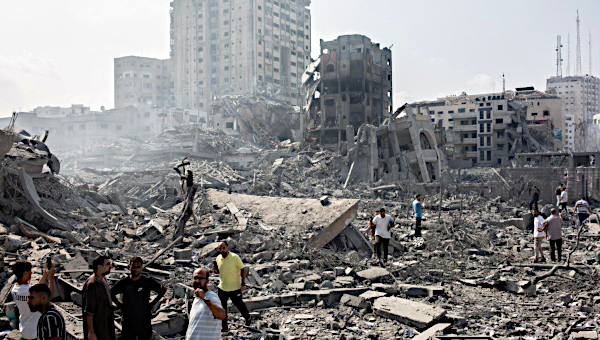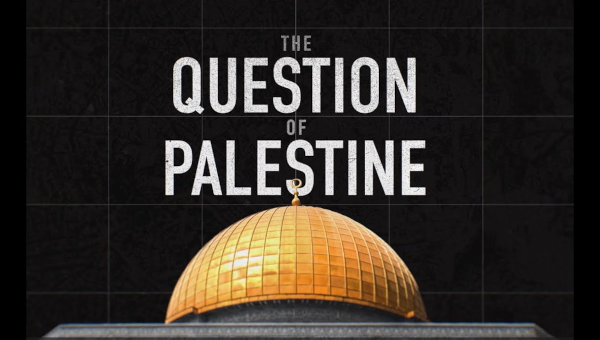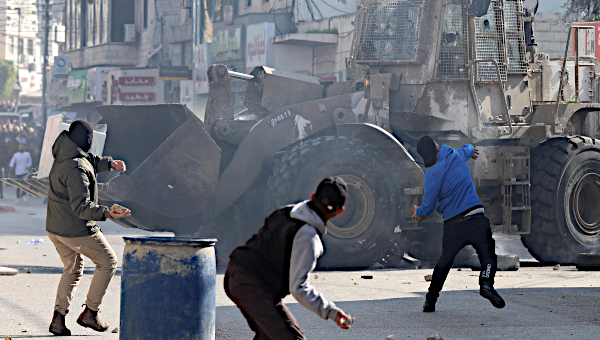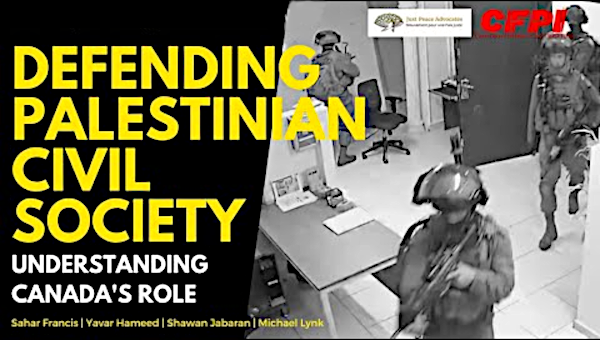Where’s Palestine in the Canadian Election?
Many will certainly remember that incredibly friendly moment, during the otherwise acrimonious recent U.S. Vice-Presidential debate, when Republican candidate Sarah Palin reached out to her Democratic rival Joseph Biden, saying she was: “encouraged to know we both love Israel and I think that is a good thing to agree on.” Arguably, observing the Canadian election process, one gets the impression that this warm sentiment would be shared by party leaders north of the border – from Stephen Harper all the way through to Stéphane Dion, Jack Layton, Elizabeth May and even Gilles Duceppe – most of whom appear ready to join Palin (though with varying degrees of enthusiasm) in endorsing Israeli apartheid in one variety or another.
Injustice’s Shining Allure?
In Canada, we are witnessing another election cycle in which foreign policy questions have been largely relegated to the proverbial ‘backburner.’ To the extent that the oppression of the Palestinians has been an issue, cross-party affirmations of support for Israel have been widespread. Thus, even Green Party leader Elizabeth May felt compelled to argue that: “We need to recognize that Israel is the bulwark of democracy and a healthy society” in the Middle East during a recent interview. May didn’t bother to offer reasons why voters ‘need to recognize’ this contentious assertion, instead treating Israeli apartheid as so self-evidently virtuous that she felt no compulsion to offer evidence to back her claims.
While many small ‘l’ Canadian liberals might justifiably laugh-off Palin’s Reaganite naïve view of the USA as ‘that shining city on a hill,’ many will nonetheless insist on maintaining a similarly idealized picture of that other ‘city on a hill’ – Israel’s gleaming colonial project in the Middle East. For many middle-class liberals, Israel has served as a symbolic beacon of ‘shared democratic values’ in a region of the world that many seem afraid of. For others, the topic has been ‘too controversial,’ or ‘too complicated’ or ‘hopeless’ and the preference has been to simply stay quiet. Such (heavily racialized) predispositions are something that Israel’s consul general in Toronto, Amir Gissin, is trying to play-up in order to convince residents of the city – by means of a $1-million ‘Brand Israel’ re-branding campaign – that Israel is worth another chance.
Of course, one does not need to look far to understand the ability of Canadian party leaders to ignore Palestine’s ghettoes and Bantustans during this election season. One just needs to consider their deafening silence on the situation of indigenous peoples here on Turtle Island and it becomes clear how what Ryerson sociology professor Alan Sears has identified as ‘settler solidarity’ functions. This type of ‘solidarity’ is something that Israeli brand experts have apparently picked up on, by promoting North American tourism to Israel in what are apparently meant to be enticing images speaking directly to very masculinist (and often pubescent) settler sensibilities.
The campaign has thus included images of everything from ‘real Israeli cowboys,’ to the redemptive/Biblical marketing of ‘Holy Land’ sites, to the ‘hotness’ of Israeli women (witness last year’s MAXIM feature on ‘The Women of the IDF’). Recent Canadian variations on this campaign have tried to play-up Israel’s alleged ‘multicultural democracy,’ its ‘environmentalism’ and its health-care system by simply omitting the racial differentiation characterizing access to these.
Meanwhile in Palestine…
The mythmaking quality of Israel’s rebranding campaign aside, it’s not like opportunities have been lacking for Canadian party leaders to condemn Israel’s legislated racism and militarized control over Palestinian life. According to the Palestinian Center for Human Rights (PCHR), in the month since the Canadian elections’ were called the Israeli military has:
- carried out at least 170 incursions into Palestinian villages, towns and cities;
- arrested 155 Palestinian civilians (including 30 children);
- injured at least 68 Palestinian civilians (including 16 children), and transformed three houses into military bases.
Settler militias have also started attacking Palestinian farmers and burning down olive trees in what has become a yearly occurrence coinciding with the seasonal olive harvest. There were also the intense race-riots triggered this past week in the city of Akka (Acre), after Taufik Jamal and his daughter were nearly stoned to death by Jewish extremists for having ‘provocatively’ smoked ‘cigarettes’ and ‘played music’ in his car (‘violating’ Israeli religious proscriptions on such behavior during Yom Kippur even though the father and daughter aren’t of the same faith and deny behaving in these ‘offensive’ ways).
Finally, during this period, PCHR reports that 6 Palestinian civilians were killed at the hands of Israeli forces, including:
- Naheel ‘Awni ‘Abdul Rahim, 21, from Qasra village southeast of Nablus, who gave birth to a dead baby at Hawara checkpoint due to the restrictions on Palestinian movement imposed by the Israeli military (September 5);
- Waleed Fareed Waleed Fraitakh, 22, a plumber from Nablus shot by the Israeli military while returning home after work (September 10);
- an unnamed Palestinian boy shot by the Israeli army in Taqqou’ village near Bethlehem (September 13);
- Suhaib Yasser Ahmed Saleh, 14, from Southern ‘Assira village near Nablus shot through the chest and right leg (September 20);
- Miriam Ahmed ‘Ali ‘Ayad, 56, killed in Abu Dis, near Jerusalem, when she was pushed down the stairs of her family home by an Israeli soldier, splitting her head open as a result (September 20);
- and Yahia ‘Atiya Fahmi Bani Monya, 18, from ‘Aqraba village southeast of Nablus, kidnapped by settlers while grazing his sheep, only for his bullet riddled body to be found later dumped 1km from the Jetit settlement in an area prohibited to Palestinians (September 27).
In the Gaza Strip, as the PCHR explains, the conditions of siege continue to take their toll, with health services
“severely affected by the siege…Critically ill patients are still being denied permits to access vital health services in the West Bank, Israel and abroad. Water facilities, including access to clean drinking water, and the treatment of raw sewage continue to be severely disrupted by fuel shortages. 50-60 million liters of untreated and partially treated sewage are being dumped into the Gaza Strip Mediterranean Sea daily, posing a public health risk. Hundreds of Gazan students are currently unable to resume their university studies…The Gaza Strip had been suffering from chronic shortages of fuel supplies, especially cooking gas, and electricity is still being cut-off for long periods of time.”
This is in addition to poverty rates of some 80%, massive unemployment, and increasing malnutrition that are all attributable to the blockade. As the PCHR notes:
“despite the Egyptian brokered ‘Tahdiya’ or truce between Palestinian resistance groups and Israel that began on 19 June; there have been no major changes regarding the movements of civilians and goods through the six Gaza Strip border crossings.”
Grabbing Some Votes by Increasing Civilian Pain?
In fact, the only candidate to actually refer to Palestinian civilians with anything resembling a clear policy preference, was Liberal candidate Ken Dryden, who during an all-candidates debate in Toronto chillingly stated that Canada must: “Stop all aid that flows into Gaza. While that may seem a harsh measure that will hurt Palestinian civilians… it is the right thing to do at this time.” While Dryden has since ‘clarified’ that he only meant cutting government-to-government assistance – on which hundreds of thousands of Palestinians depend! – his initial comments highlight an almost reflexive callousness towards Palestinians that is shared by many politicians currently running for office in Canada.
In fact, Dryden’s comments endorsing collective punishment, faithfully echo the main justification for Israel’s blockade of Gaza. The siege is thus explicitly calculated to impose massive civilian suffering for the audacity of Palestinians to choose a government through… ballots!! Dov Weisglass, one of Ariel Sharon’s top advisors, clarified shortly after the 2006 Palestinian elections that the blockade was intended to be: “like a meeting with a dietician. We have to make them much thinner, but not enough to die.” Last spring Israel’s Deputy Defense Minister Matan Vilnai went further, arguing that Palestinians were risking a ‘shoa’ (catastrophe / holocaust) in Gaza if they continued their resistance.
Moving Forward After Election Day?
Of course, this is not to say that the position of every party in Canada reflects such racist (even génocidaire?) positions. There are grassroots currents within the Green Party, the NDP and the Bloc that consistently push for principled positions on international issues. However, in cases where parties have taken an official stand – the NDP and Green Party electoral platforms are the only ones that contain explicit policy statements on ‘Israel and Palestine’ – they simply fail to unequivocally condemn Israeli apartheid, preferring instead to equate the oppressed and the oppressors. This is often done in a usually unsuccessful attempt to avoid neo-conservative, rightwing and racist ‘pro-Israel’ flak, while simultaneously attempting to placate social-justice seeking constituencies within their own party. A ‘safe’ position thus becomes supporting a ‘two state solution’ while remaining silent on the fate of 5-million Palestinian refugees denied the fundamental right of return or the 1.5-million Palestinian citizens of Israel living legislated racism everyday.
These silences are especially problematic given that in recent years a consensus has developed within Palestinian civil society on the best non-violent method of moving forward with the struggle for justice in the Middle East – i.e. support for a comprehensive grassroots boycott, sanctions and divestment (BDS) campaign that seeks an end to Israel’s occupation of all Arab lands (40+ years), the return of refugees (60 years) and the recognition of equal civil and political rights for Palestinians living in Israel (60+ years).
Concretely, what support for this campaign would mean if translated into the context of the Canadian political scene, would be to call on the next government to immediately suspend cooperation agreements with Israel, including the Canada Israel Free Trade Agreement (CIFTA) and the Canada Israel Industrial Research and Development Fund (CIIRDF). These agreements contribute to the over $1-billion dollars in bilateral trade and over $2-billlion worth of foreign direct investments linking Israel and Canada (including dozens of security related joint projects).
However, support for such measures will mean bringing the carefully constructed, semi-biblical image of Israel fostered within the North American political imaginary into question. Endorsing Palestinian perspectives on their dispossession during an election campaign might also mean that settler politicians in Canada might have to confront the uncomfortable truth that Canada itself was built on and continues to depend on the exploitation of lands stolen from the indigenous peoples of Turtle Island. I guess this is something progressives will be thinking about long after Election Day, which this year falls right after the ‘Thanksgiving Weekend.’
To learn more about the global BDS visit www.bdsmovement.net or log on to www.caiaweb.org. •





